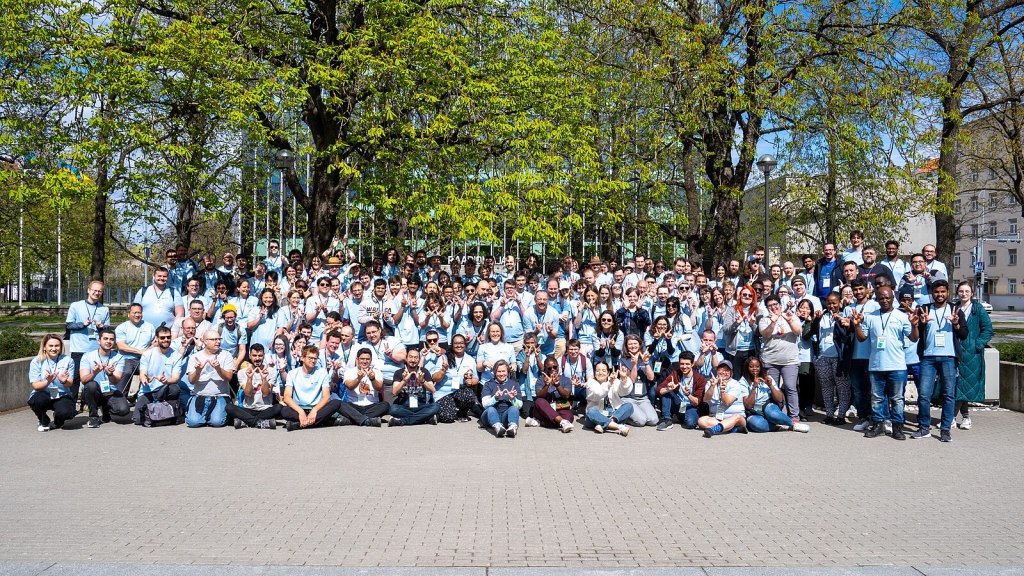
The 2024 Wikimedia Hackathon, held from May 3rd – 5th in Tallinn, Estonia, brought together a highly technical group of enthusiastic participants from around the world to collaborate, innovate, and drive progress on Wikimedia projects.
This year’s hackathon was guided by two core objectives:
- Innovate and Create: Design and build innovative projects that showcase creativity and technical expertise. The hackathon embodied the spirit of innovation and creativity. Participants designed and built projects that expanded the possibilities of how people interact with our content: there were projects that transliterate articles in a new script, to help see our code, to show facts within a panorama, to celebrate what you read on Wikipedia, and to help you listen to articles. The outcome was impressive, with over 80 hacking projects developed and 43 outstanding projects presented at the closing showcase, which can be relived through the video recording and showcase notes. This achievement highlights the hackathon’s innovation and creativity, where participants brought their ideas to life and demonstrated their technical skills.
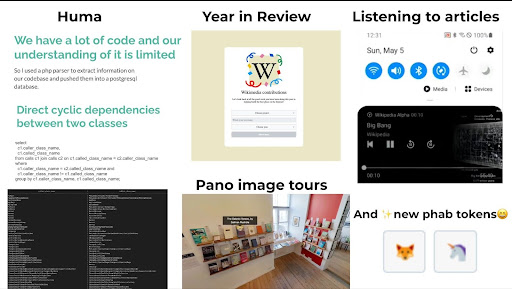
- Connect and Collaborate: According to post-event feedback, the hackathon fostered meaningful connections among participants, encouraging knowledge sharing, collaboration, and community building. Participants shared their experiences and feedback on how the event helped them achieve these goals:
- “I feel onboarded now, and part of the community.” (First-time participant who felt welcomed and integrated)
- “I collaborated with other staff to prototype features and gather user feedback.” (Staff member who benefited from teamwork and feedback)
- “I established connections with people from the technical community and gained clarity on problem-solving.” (Participant who valued the exchange of ideas)
- “I met people in person for the first time, collaborated with them, and improved relationships.” (Participant who appreciated the in-person connections)
- These testimonials highlight how the event’s built a sense of community–facilitating collaboration, and fostering meaningful relationships among participants.
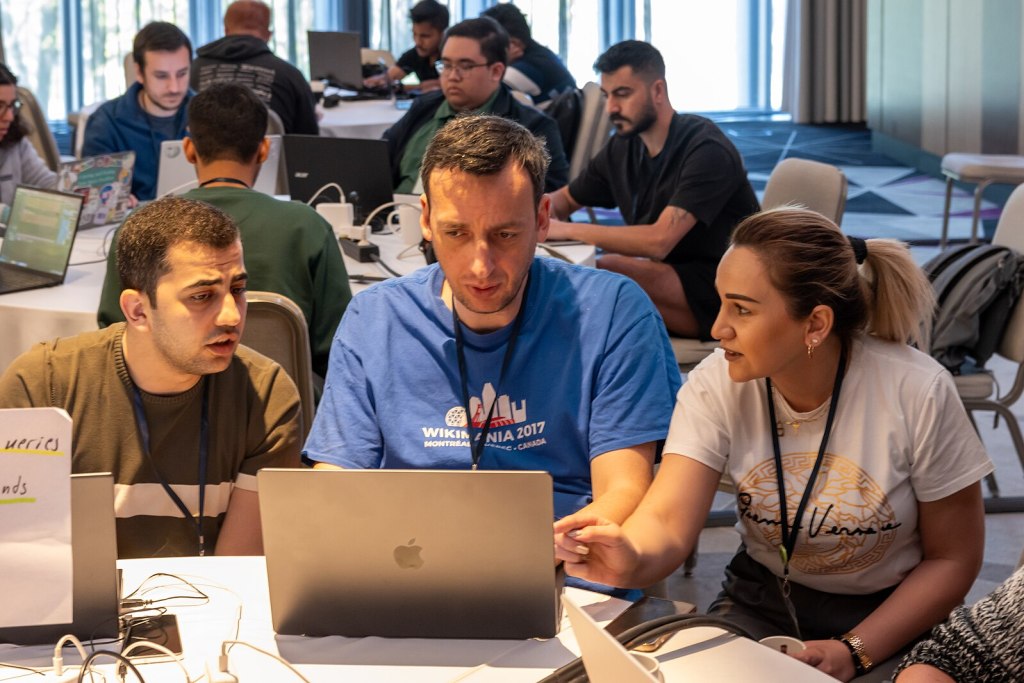
Program Highlights
- We welcomed 176 participants from the 8 regions of the world. According to the post-event survey, 33% of respondents identified their region, aligning with the Wikimedia movement’s global regions. As seen in the chart below, the majority of participants hailed from Northern and Western Europe, followed by North America. Notably, we saw an increase in representation from Sub-Saharan Africa compared to last year’s event, reflecting our efforts to promote global inclusivity.
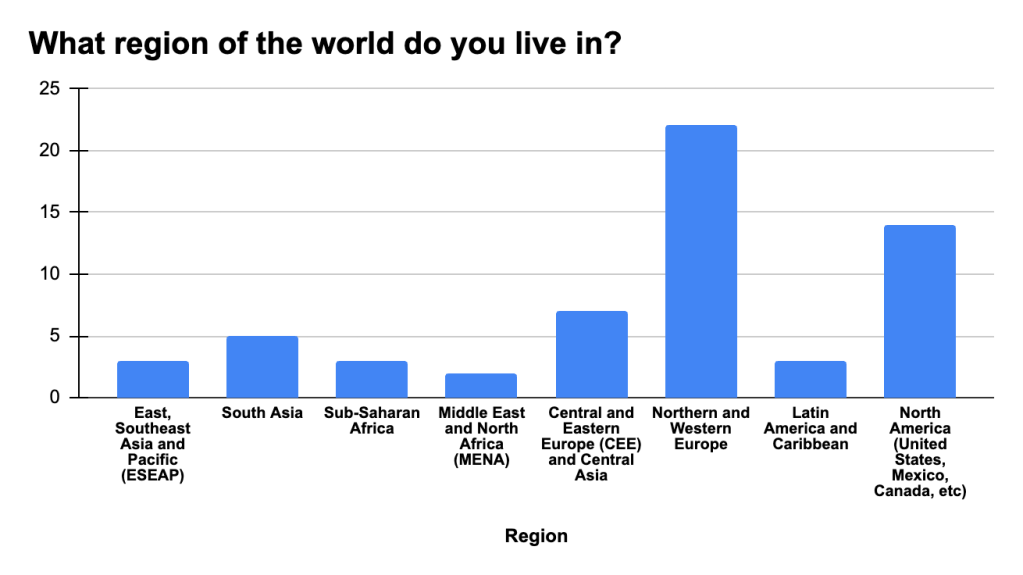
Furthermore, a significant portion of our attendees (48%) benefited from scholarships to attend the event, highlighting the importance of these opportunities in facilitating participation.
- Our participant pool was diverse, representing various affiliations within the movement, including:
- Volunteers with varying levels of experience (5+ years and <5 years)
- Developers and technical contributors
- Contributors to Wikipedia projects like Commons
- Members of Wikimedia Chapters and Affiliates
This diversity enriched our event with a wide range of perspectives and expertise.
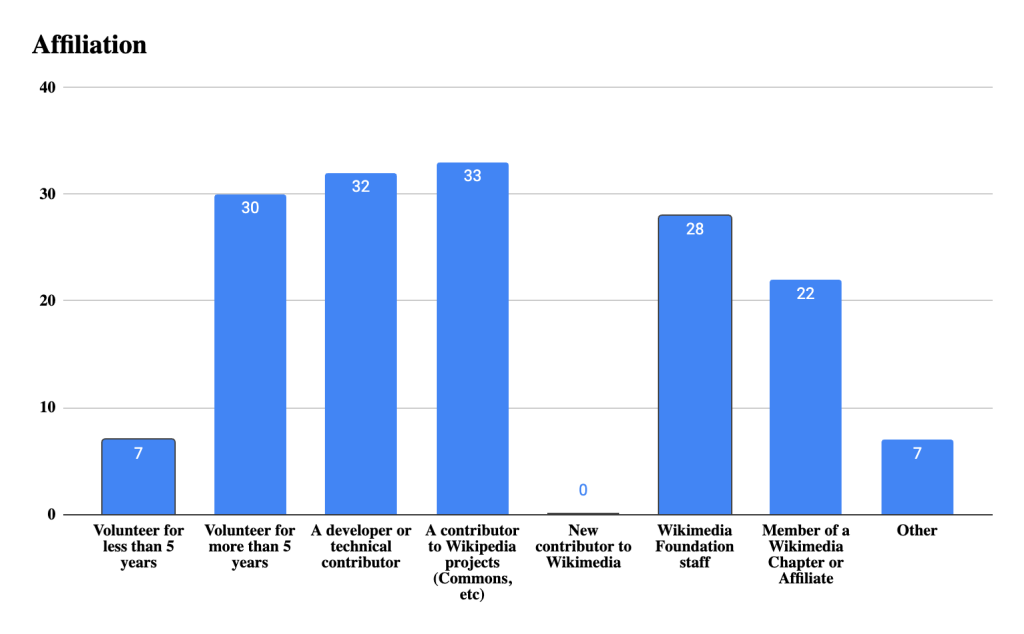
- Out of the 57 (33% of total attendees) participants who completed the post event survey 91% reported that the hackathon helped them achieve the goals that they set for themselves. Here are some of their achievements, in their own words:
- Collaborated with staff and community members
- Prototyped features and gathered user feedback
- Learned about projects and people in their area of work
- Resolved tensions and expressed themselves freely
- Learned new topics and reinforced knowledge
- Met people face-to-face and established connections
- Discussed stalled tasks and gained understanding
- Learned the “proper” way to run unit tests in MediaWiki core
- Met people they had worked with for years and new people
- Improved relationships and formed new connections
- Completed various projects and made progress on others
- Had fruitful discussions with community members
- Learned more about MediaWiki’s backend and how to contribute
- Shared knowledge and experiences with others
- Understands better how developers interact within the community
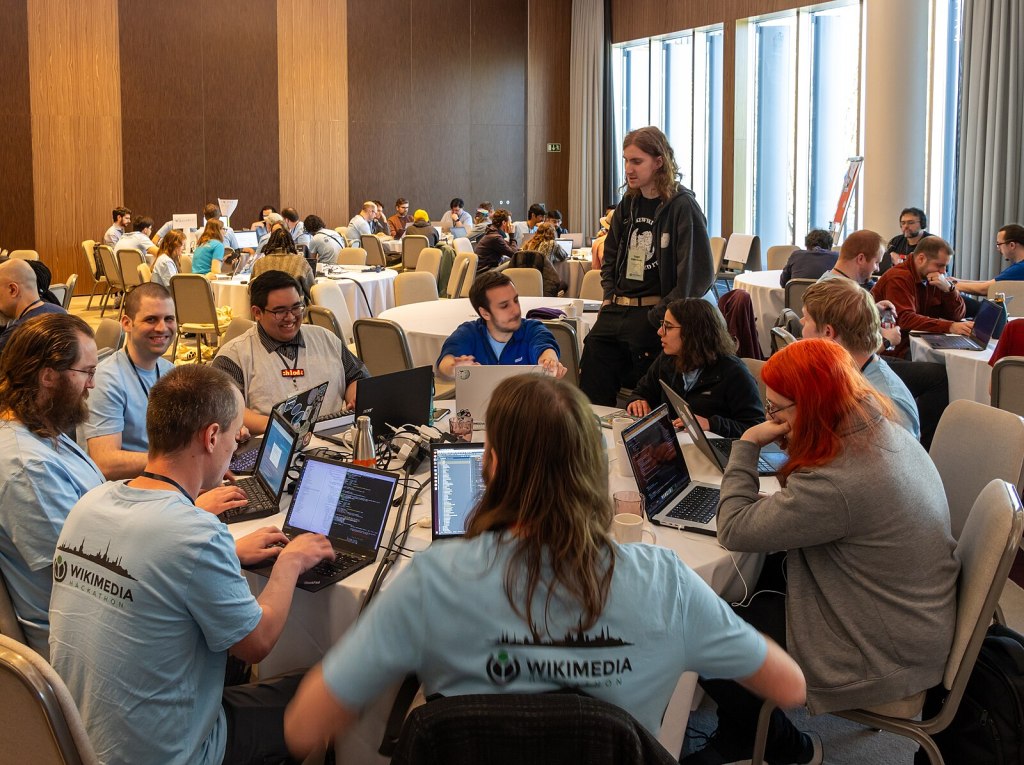
- During the Hackathon, participants collaborated on a wide range of technical areas, showcasing their diverse skills and expertise. Some contributors focused on MediaWiki / MediaWiki Core, while others worked on improving gadgets, user scripts, modules, templates. Technical areas of contribution included bug and feature request management, bots and tools, mobile or desktop apps, and documentation, among others. Additionally, participants with experience in UX/UI design, and project management also played a crucial role in shaping the projects. Overall, the Hackathon brought together a talented group of individuals who worked together to advance various technical areas, resulting in impressive project outcomes.
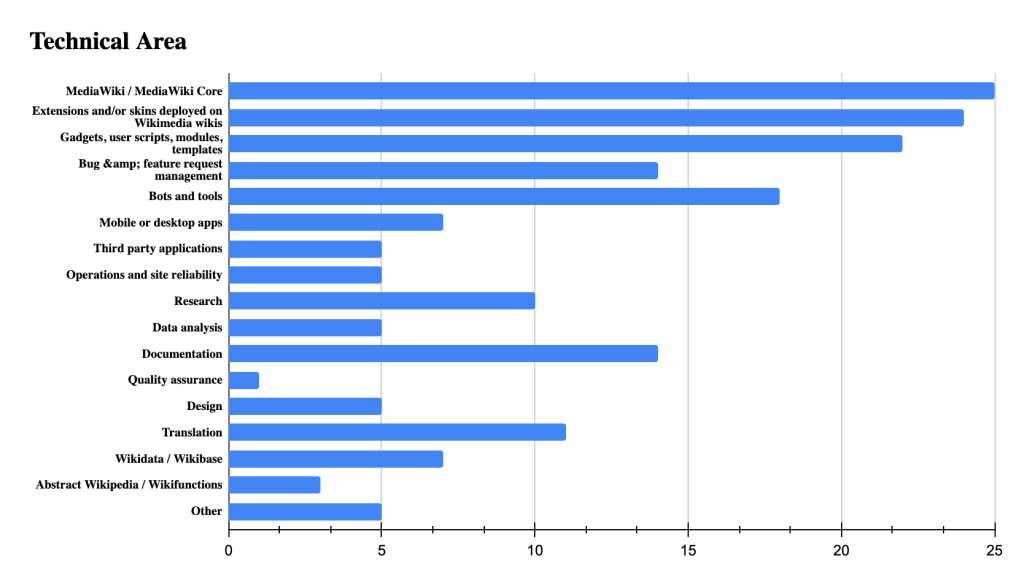
- We gauged the participants’ opinions by asking them to rate several affirmations on a scale from “strongly agree” to “strongly disagree”. This helped us understand their level of agreement or disagreement with various statements, allowing us to gather valuable insights into their thoughts and perceptions. The affirmations covered a range of topics, and participants were encouraged to share their honest opinions, providing us with a comprehensive understanding of their views and sentiments.
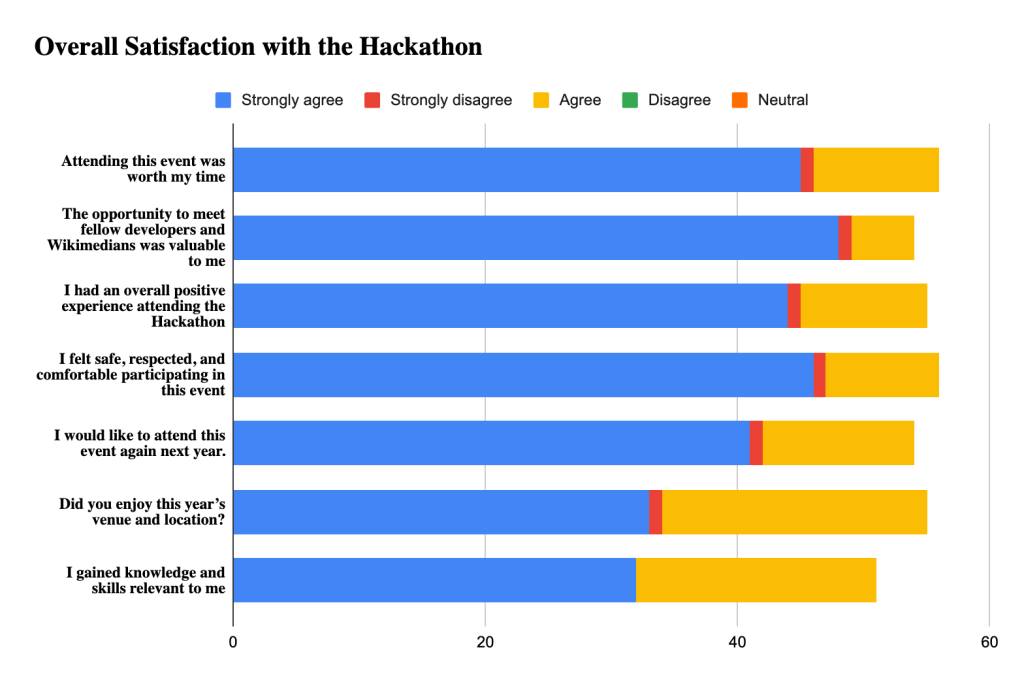
- What activity did you collaborate on with peers? – As a part of the post-event survey, we asked attendees to reflect on their collaborative experiences, inquiring about the specific activities they worked on alongside their peers. This question aimed to uncover the diverse projects and initiatives that emerged during the event, showcasing the creativity and innovation that arose from collective efforts. By sharing their responses, participants highlighted the various coding challenges, problem-solving exercises, and creative endeavors they undertook together, providing a glimpse into the dynamic and collaborative spirit that defined the hackathon.
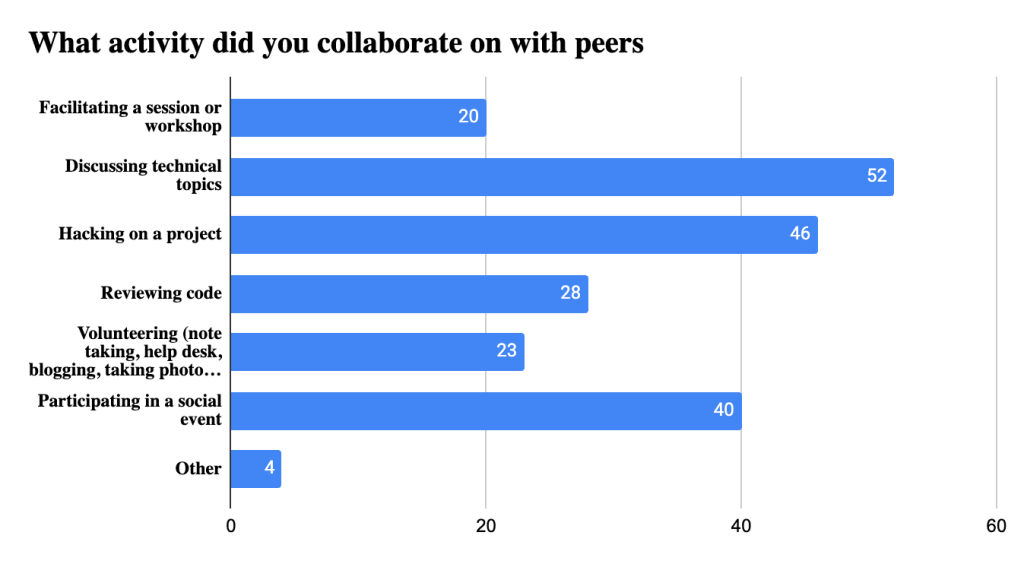
Learnings and Recommendations
We also asked people the following question: “How else can we design the Hackathon in the future to help attendees learn, collaborate, and connect? and here’s are the responses we received broken down into these categories:
Suggestions for Improvement:
- Provide a variety of simple and plain food options to cater to diverse tastes and dietary needs.
- Increase senior management attendance to show appreciation for contributors’ work and foster open communication.
- Foster closer collaboration between engineers and designers through joint sessions and projects.
- Provide event badges with additional information (e.g., project/area of interest) and use clear signs and customizable badges to facilitate connections.
- Reduce barriers for newcomers by offering more affordable venues, clearer documentation, and a more welcoming environment.
- Extend the event duration or consider bi-annual events, including one outside Europe, to facilitate more connections and knowledge sharing.
- Implement a comprehensive health and safety policy, including carbon monoxide meters, air filters, mandatory COVID testing, and a table numbering/map system to facilitate collaboration and presentation organization.
- For future events, consider using alternative operating systems for shared presentation computers to avoid any compatibility issues or limitations associated with macOS or Windows.
Positive Feedback:
- The event’s organization and format were excellent, featuring great talks, a convenient venue, and a well-structured schedule that encouraged learning, collaboration, and creativity.
- The unconference-style format and co-located accommodation fostered a sense of community, allowing attendees to connect and work together seamlessly.
- The event’s inclusive and diverse nature was made possible by the scholarship program, which should continue to be offered to ensure a diverse range of perspectives and ideas.
- The flexible format allowed attendees to work on projects, collaborate, and enjoy meals together, making the event feel fresh and enjoyable for both new and returning attendees.
- Overall, the event’s format, organization, and structure were perfect, providing a unique and valuable experience that should be continued in future events.
Suggestions for supporting longtime contributors at Future events
- Prioritize supporting existing contributors and offer mentoring slots for short-time contributors, while also improving support for global south attendees and clarifying the program schedule.
- Consider allowing shorter sessions (5-15 minutes) for sharing tech tips, pitching new projects for uptake by volunteers etc.
- The event organizers’ commitment and dedication were impressive, and the scholarship program should continue.
- Providing better support and resources for Global South attendees to attend and fully participate in the event.
Conclusion & Recognition
Pulling off a successful event truly takes a village, and we had a talented village! 😀 A heartfelt thank you to our incredible Organizing Team🎖WMEE (Wikimedia Eesti), – Ivo Kruusamagi, WMF – (Amanda Bittaker, Onyinyechi Onifade, Deb Tankersley, and Karen Hernandez), Travel Team (Erin Morris & Nikki Maller), and our vigilant Trust and Safety Representatives, who all worked tirelessly to keep everything on track.
A special shoutout also goes to our army of volunteers, the ever-helpful Volunteer Coordinators, the Mentors, Session Facilitators, Note Takers, Photographers and everyone else who jumped in to answer questions, review code, make connections, and generally save the day. You all contributed to the success of the event.
The Wikimedia Hackathon 2024 demonstrated the power of collaborative innovation in driving progress on Wikimedia projects. We’re proud of the projects developed and the connections made. We look forward to building on this success and creating even more impactful events in the future. See you at the 2025 edition of the hackathon! 🎉

Can you help us translate this article?
In order for this article to reach as many people as possible we would like your help. Can you translate this article to get the message out?
Start translation